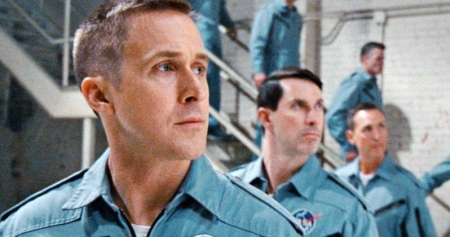The just released new Hollywood movie detailing the life of Neil Armstrong, First Man, has so far gotten rave reviews.
Sadly, however, there is one detail about the Apollo 11 mission that the filmmakers decided they couldn’t include, even though it was in many ways the entire point of the mission. They made a conscious decision to exclude any mention of the planting of the American flag on the surface of the Moon.
Star Ryan Gosling, who plays Armstrong, defended director Damien Chazelle’s decision to omit the star-spangled moment when asked about it in Venice. “I think this was widely regarded in the end as a human achievement [and] that’s how we chose to view it, ” Gosling said per the Telegraph. “I also think Neil was extremely humble, as were many of these astronauts, and time and time again he deferred the focus from himself to the 400,000 people who made the mission possible.”
The Canadian actor added that based on his own interviews with Armstrong’s family and friends, he doesn’t believe the pioneering astronaut considered himself an American hero. “I don’t think that Neil viewed himself as an American hero,” Gosling said. From my interviews with his family and people that knew him, it was quite the opposite. And we wanted the film to reflect Neil.” [emphasis mine]
This is bunk. All the astronauts who flew to the Moon were very aware that they were warriors in the Cold War against the Soviet Union and communism, and did it very consciously so that the U.S. could win that space race, for the U.S. Planting the flag was thus for them a very important aspect of the mission, maybe in many ways the most important.
That these Hollywood filmmakers purposely excluded that moment only illustrates to me once again the hostility, even hate, that the modern elitist culture has for the United States and everything it has stood for since 1776: freedom, blind justice before the law, and individual responsibility. Here it appears they are making an effort to separate that very decidedly American culture, which made the lunar landing possible, from that achievement. They want to honor Armstrong as an individual, but do not want to give any credit to the country and culture that sent him to the Moon. Instead, they want to claim that the Apollo landings were merely “a human achievement.”
For shame.
This makes me very unwilling to spend any money to see this movie. Why should I support the work of such intellectually dishonest people?
I must add that I have already been emailed by several readers who are similarly outraged. I wonder therefore if this will turn into something that will actually hurt ticket sales. I suspect not, as too many Americans today do not care very much about these issues. They will go to be entertained, and many will buy into the lie that the Apollo missions was an achievement not of America but of the entire global world, working together in love and peace.

